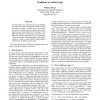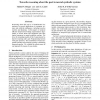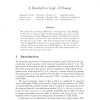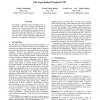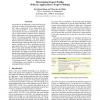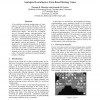IJCAI
2007
15 years 2 months ago
2007
If modal logics for coalitions need to be applied, one must know how to translate coalition power into agents’ actions. To these days, the connection between coalition power and...
IJCAI
2007
15 years 2 months ago
2007
Reasoning about the past is of fundamental importance in several applications in computer science and artificial intelligence, including reactive systems and planning. In this pa...
IJCAI
2007
15 years 2 months ago
2007
In this paper we propose a suite of techniques for planning with temporally extended preferences (TEPs). To this end, we propose a method for compiling TEP planning problems into ...
IJCAI
2007
15 years 2 months ago
2007
In this paper, we present a new decompositional approach for the extraction of propositional rules from feed-forward neural networks of binary threshold units. After decomposing t...
IJCAI
2007
15 years 2 months ago
2007
We combine the modal logic S5 with the description logic (DL) ALCQI. In this way, we obtain a multi-dimensional DL, S5ALCQI, whose purpose is reasoning about change. S5ALCQI is ca...
117
click to vote
IJCAI
2007
15 years 2 months ago
2007
We define a translation from Weighted CSP to signed Max-SAT, and a complete resolution-style calculus for solving signed Max-SAT. Based on these results, we then describe an orig...
IJCAI
2007
15 years 2 months ago
2007
128
click to vote
IJCAI
2007
15 years 2 months ago
2007
A key problem in playing strategy games is learning how to allocate resources effectively. This can be a difficult task for machine learning when the connections between actions a...
IJCAI
2007
15 years 2 months ago
2007
We describe an approach to the use of case-based techniques for natural language understanding and for action planning in a system for dialogue between a human and a robot, which ...
113
click to vote
IJCAI
2007
15 years 2 months ago
2007
Agents with partial observability need to share information to achieve decentralised coordination. However, in resource-constrained systems, indiscriminate communication can creat...
